Anguish
by R.E. Slater
I
Two guests arrive at a wedding, one invited and one not...
A delivery driver pulls into a parking lot to decide whether to quit or continue his route...
A young mother picks up her kids from school returning home remembering all the dreams
she once dreamt as a youth...
A ballerina dances gracefully across the stage wondering if fulfillment meant more than this…
An older pastor, now retired, thinks back to his school days wondering if he heard God's call
aright or simply his own self urging forward...
A college student sits in class wondering if his lessons enlighten so much as persuade...
Two sisters lead happy lives but neither are happy within....
II
Two streams diverged in a woods - one to wander through the bramble and hillocks,
the other to grow wider, deeper; which were the more successful?
If fate chooses fortune, or fortune fate, what chooses the other to do the choosing?
If wonderment is stillborn can awe ever follow?
Where do dreams go if they die within?
If evil brought good how can good succeed against such horror?
If life wrought ruin is life better lived unloved or unlived?
Can anguish be escaped or does it define who we are?
III
If all choices never were choices but momentary streams wresting apart could one ever
be sure which stream to follow?
If old age brought wisdom can youth have none without experience or regrets?
If regrets pile up one upon another can its force be overturned?
Can the eye that guides the heart serve the heart if betraying itself?
Where can peace be found if peace can nowhere be found but within?
Were enlightenment all one thing gathered together could it ever be known?
Two guests arrived at a wedding - who then was invited if no wedding was held?
R.E. Slater
May 7, 2017
@copyright R.E. Slater Publications
all rights reserved





